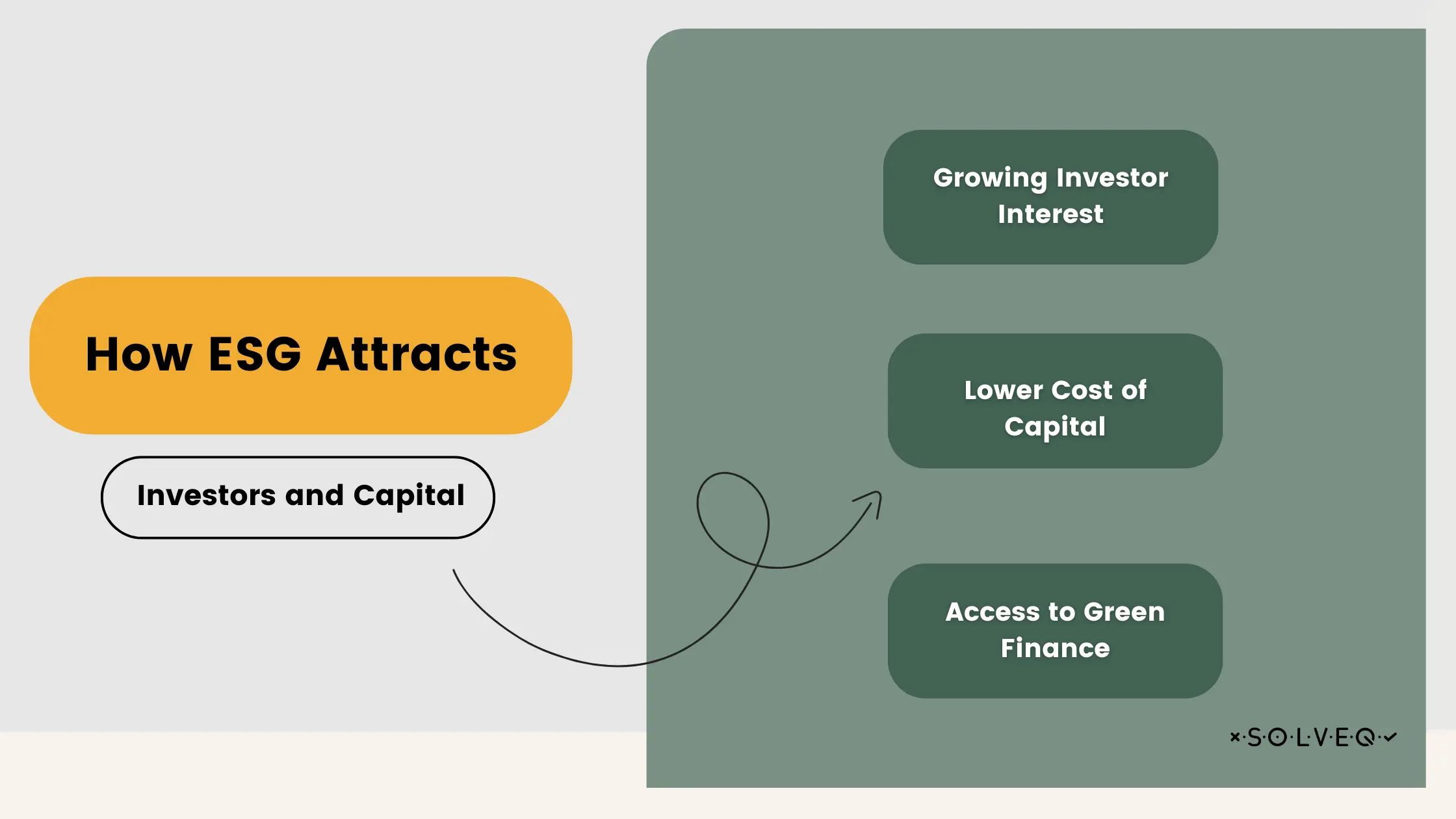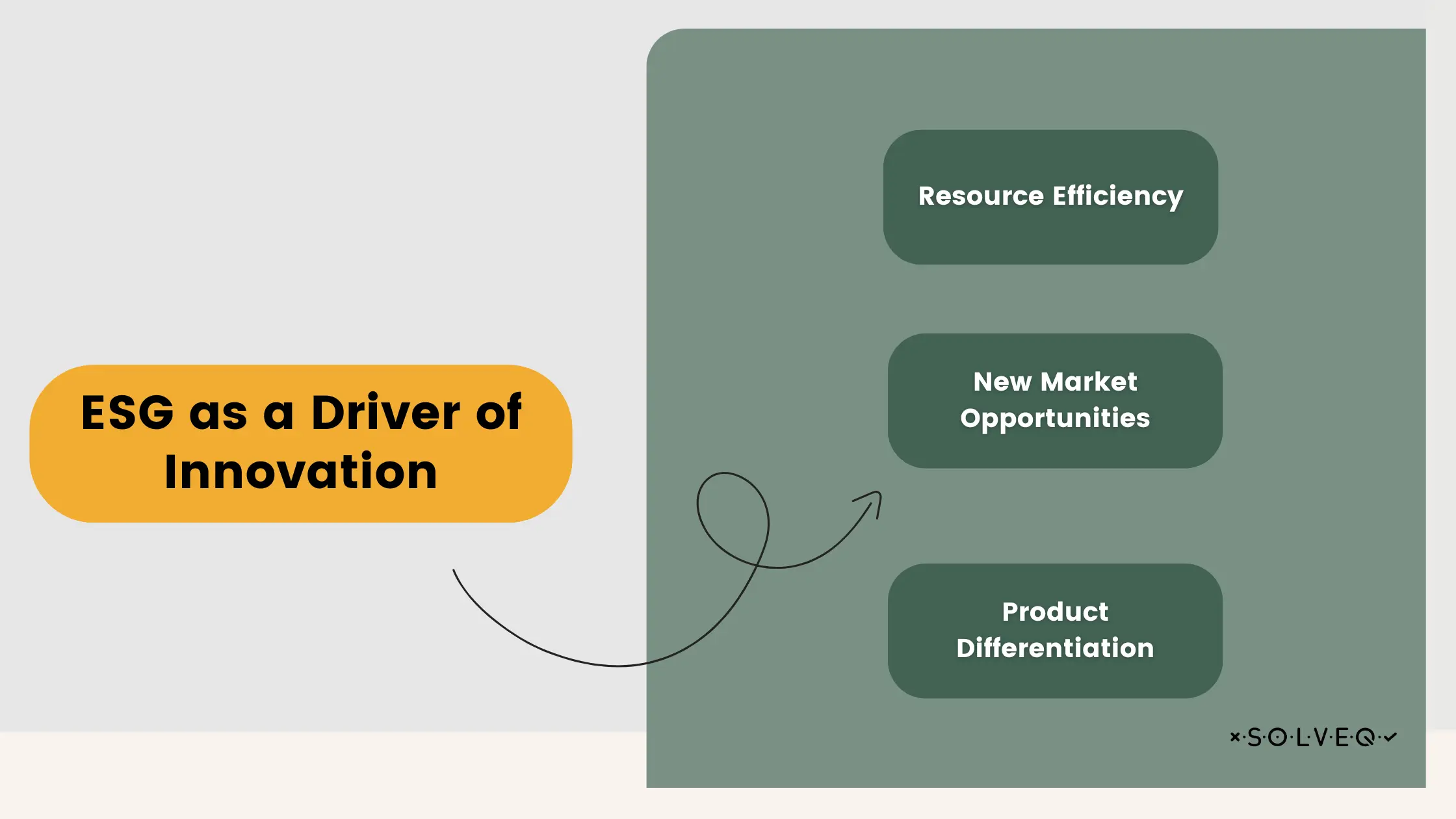The Business Case for ESG: How Sustainability Drives Profitability
7 May 2024 • 12 min read

Marcin Kulawik

We often think of sustainability and business as separate concepts, with profit rarely entering the sustainability conversation. In fact, these two might seem like opposing forces. But what if I told you they're more connected than ever?
We're here to challenge that misconception and show you how strong Environmental, Social, and Governance (ESG) performance can actually lead to enhanced financial returns and a strategic edge for your company.
ESG used to be a buzzword, then a difficult obligation. But now, it's an opportunity to grow and save money! We'll delve deeper into the details later, but for now, let this be your sneak peek into the exciting world where sustainability meets profitability.
ESG and Risk Mitigation: A Smart Shield
Strong ESG performance isn't just about feeling good - it's about fortifying your company against real-world threats. Let's explore how:
Reduced Operational Risk
Imagine a future where environmental regulations tighten, or natural disasters become more frequent. Companies with weak environmental practices could face hefty fines for pollution or struggle to recover from climate-related damage. But those with strong ESG initiatives, like investing in renewable energy or sustainable waste management, are already mitigating these risks.
Think about it: wouldn't proactive investment in cleaner operations save money on future fines or costly repairs from environmental incidents?
Enhanced Reputation
Consumers today are increasingly conscious, and a company's ESG practices are under constant scrutiny. A social media scandal or unethical labor practices can spark boycotts and damage your brand image, leading to significant financial losses.
Remember the clothing company that faced backlash for sweatshop conditions? Their sales plummeted! On the other hand, companies that prioritize fair labor practices and social responsibility build trust and attract a loyal customer base.
Regulatory Compliance
The regulatory landscape around ESG is constantly evolving. Companies that proactively implement ESG standards are better positioned to navigate upcoming regulations, avoiding costly compliance scrambles and potential penalties.
Take, for example, the growing focus on carbon emissions. Companies that invest in reducing their carbon footprint today will be ahead of the curve when stricter regulations are implemented. This proactive approach saves money and avoids the risk of hefty fines for non-compliance.
By prioritizing ESG, you're essentially building a shield against future risks, protecting your bottom line and setting your company up for long-term success.
ESG Attracts Investors and Capital: A Magnet for Growth
Strong ESG performance isn't just about mitigating risks; it's also about attracting valuable resources. Here's how:

Growing Investor Interest
The tide is turning. Investors are increasingly seeking out companies that prioritize ESG. Sustainable funds are experiencing explosive growth, managing trillions of dollars worldwide. Studies even suggest that companies with strong ESG practices may outperform their less sustainable peers.
Think about it: wouldn't investors be more likely to put their money in a company that demonstrates long-term vision and responsible management practices? ESG is becoming a key factor in investment decisions, and companies with strong ESG performance are positioned to benefit from this growing pool of capital.
Lower Cost of Capital
Beyond the sheer volume of investor interest, strong ESG can translate to real financial benefits. Companies with a proven track record of environmental responsibility, social good, and ethical governance often qualify for lower interest rates on loans and bonds. Several studies have shown a clear correlation between high ESG scores and lower borrowing costs.
In simpler terms, a strong ESG profile paints a picture of a well-managed, future-proof company. This translates to lower risk for lenders, allowing them to offer you more favorable borrowing terms.
Access to Green Finance
The world is recognizing the importance of sustainability, and that includes the financial sector. A growing pool of capital, known as "green finance," is specifically dedicated to funding sustainable businesses and projects. This includes banks offering loans with preferential rates for companies with strong ESG practices.
Imagine having access to dedicated funding sources specifically designed to support your sustainability initiatives. This opens doors to new investments, growth opportunities, and a competitive edge in the evolving market.
By prioritizing ESG, you're not just doing good for the planet and society; you're also making your company more attractive to investors and gaining access to valuable financial resources.
ESG as a Driver of Innovation: A Catalyst for Growth
Focusing on ESG isn't just about compliance or risk mitigation; it's a springboard for innovation and unlocking new avenues for growth. Here's how real companies are leveraging ESG to gain a competitive edge:

Resource Efficiency
By prioritizing ESG, companies are naturally driven to optimize resource utilization. This translates to:
- Energy Savings: Implementing energy-efficient practices can significantly reduce operational costs. For example, Alphabet's (Google's parent company) data centers have become a leader in sustainability, utilizing innovative cooling systems and artificial intelligence to reduce energy consumption by 40% between 2013 and 2019 Imagine the cost savings for your company by implementing similar strategies!
- Waste Reduction: Minimizing waste through process improvements and recycling initiatives not only benefits the environment but also reduces disposal costs. Levi Strauss & Co., a well-known clothing manufacturer, adopted sustainable production methods like using laser finishing techniques instead of traditional water-intensive washing processes. This innovative approach cut down on water usage by millions of liters and fabric waste by 30%, saving them money and allowing them to promote their environmentally conscious practices source
New Market Opportunities
Consumers are increasingly making purchasing decisions based on a company's ESG values. By addressing sustainability concerns, you can:
- Tap into Sustainability-Conscious Markets: The market for environmentally friendly products and services is booming. Beyond Meat, a plant-based meat substitute company, successfully targeted environmentally conscious consumers with their realistic and delicious plant-based burgers, experiencing a whopping 2,300% growth in sales revenue between 2014 and 2019.
- Unlock New Revenue Streams: Innovative solutions addressing environmental or social issues can generate new revenue streams. WaterHealth International, a social impact company, developed a low-cost and easily maintainable water purification system. This innovative product allows them to reach new markets in developing countries, providing clean drinking water to millions and creating a positive social impact.
Product Differentiation
In a competitive landscape, a strong ESG commitment can set you apart:
- Enhanced Brand Image: Consumers are more likely to choose brands that prioritize responsible practices, leading to increased brand loyalty and positive publicity. Seventh Generation, a leading brand in eco-friendly cleaning products, switched to 100% recycled plastic packaging in 2018. This commitment to sustainability resonated with customers, leading to a significant increase in customer satisfaction and brand loyalty.
- Attract Top Talent: Millennials and Gen Z prioritize working for companies with strong ESG values. Patagonia, a renowned outdoor apparel company, is known for its commitment to environmental activism and social responsibility. This strong ESG profile allows them to attract and retain top talent in the competitive outdoor apparel industry.
By integrating ESG principles, you not only improve your environmental and social impact but also unlock new markets, create innovative products, and build a stronger brand identity.
ESG Improves Employee Engagement and Retention: Building a Winning Team
In today's competitive talent market, attracting and retaining top employees is crucial. Here's how a strong ESG commitment can give your company a significant edge:
Attracting Talent:
Millennials and Gen Z, the largest and fastest-growing segments of the workforce, prioritize working for companies that align with their values. By demonstrating a commitment to ESG, you can:
- Strengthen Employer Branding: A strong ESG profile positions your company as a responsible and purpose-driven organization. This resonates with values-driven candidates, attracting top talent who are passionate about making a positive impact. According to a study by Deloitte, 83% of Millennials say a company's social and environmental commitments are important to their decision of where to work.
- Attract Diverse Talent Pool: A focus on diversity, equity, and inclusion (DE&I) as part of your ESG efforts creates a welcoming and inclusive work environment for all. This wider talent pool expands your options and allows you to recruit the best people regardless of background.

Enhanced Productivity
Employees who feel good about the company they work for are demonstrably more engaged and productive. When a company's values align with their own, employees are:
- More Motivated: Purpose-driven work fosters a sense of meaning and motivation leading to higher levels of engagement and productivity. A study by Kenexa High Performance Institute found that employees at purpose-driven companies are 4x more likely to report feeling inspired at work.
- Less Likely to Leave: Employees who are satisfied and feel valued are less likely to seek employment elsewhere. A 2020 Mercer study found that companies with strong ESG practices experience 50% lower employee turnover costs.
Talent Retention
Investing in ESG translates directly to a more stable and productive workforce. Here's how:
- Reduced Turnover Costs: High employee turnover can be incredibly expensive. Strong ESG practices lead to higher employee retention, saving your company significant resources associated with recruitment and onboarding new staff.
By prioritizing ESG, you're not just doing the right thing for the environment and society; you're also building a more engaged, productive, and loyal workforce. This translates to a competitive advantage in attracting and retaining top talent, ultimately leading to a stronger and more successful company.
Conclusion
In today's world, strong ESG performance isn't just about environmental responsibility; it's a strategic investment in your company's future. By prioritizing ESG, you can mitigate risks, attract valuable investors, drive innovation, and foster a more engaged and productive workforce. These factors all contribute to a significant financial advantage. Ultimately, a commitment to ESG positions your company not just for short-term wins, but for long-term success and a place at the forefront of a sustainable future.
Share:
Looking for expert development team?
Schedule a call with Tech Consultant

Marcin Kulawik
Founder and CEO of SolveQ. Huge fan of building things with purpose, agility, and having fun while changing the World. Loves his family, teammates, and nature.